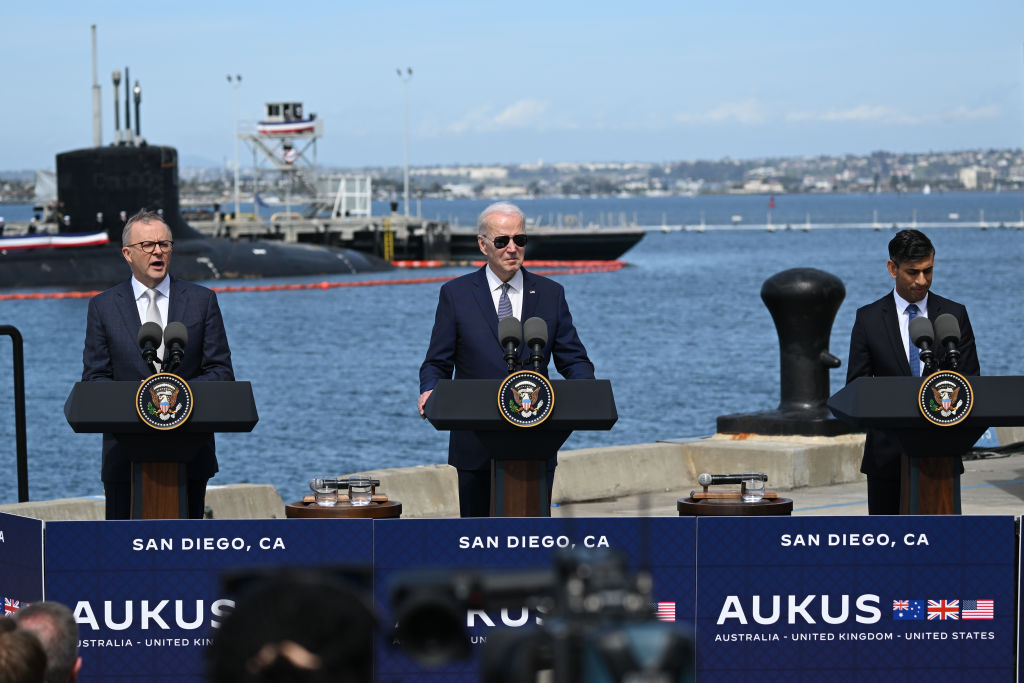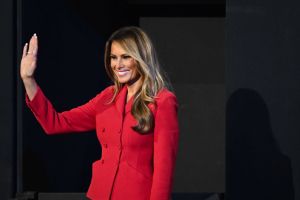There are few surprises in the AUKUS nuclear-powered submarine program announced by President Biden, UK prime minister Rishi Sunak and his Australian counterpart Anthony Albanese yesterday. Australia will get its fleet of nuclear submarines. The United States will supply Virginia-class boats to Australia for the 2030s; US Virginias and Royal Navy Astute-class boats will be stationed in Western Australia later this decade. And the three partners, under British leadership, will develop a new “AUKUS-class” of nuclear submarines for the 2040s and beyond.
It’s a hugely ambitious program — and geopolitically astute. A risk-averse Sir Humphrey Appleby might have even called it ‘courageous’. Rishi Sunak, however, was right when he told Biden and Sunak at the San Diego naval base, ‘it will mean three fleets of submarines working together across both the Atlantic and Pacific, keeping our oceans free, open, and prosperous for decades to come’. The potential global security dividend justifies the massive investment.
From Australia’s perspective, the big before-and-after difference in the announcement is the estimated cost. The Australian government was briefing a cost to Australia, up until 2055, of more than A$200 billion ($133 billion). As announced, it is now estimated to be between A$268 billion ($178 billion) and A$368 billion ($245 billion).
The scale of Australia’s capital, and civil and manpower investments, is even greater than predicted, and all from a near-standing start. Meeting the challenge will strain Australia’s military, industrial and economic resources to the limit. As of today, it is hard to see how Australia can simultaneously afford nuclear-powered submarines, an up-to-date surface fleet, F-35 Joint Strike Fighters and a small but world-class-equipped army, unless politically-unpalatable budgetary compromises are made.
As for the United States, Biden’s commitment to AUKUS and Indo-Pacific security, by raising Australia’s strategic importance and enticing Britain back east of Suez, is crucial. But it was instructive to note that the tripartite AUKUS announcement in San Diego got less American media coverage than the collapse of the Silicon Valley Bank, and even Hugh Grant’s boorish behavior at the Oscars. What is vitally central to Australia, and strategically important for Britain, is something of a sideshow for Americans.
From Britain’s perspective, the language about China in the government’s defense Integrated Review may have softened from the “threat” Sunak talked about when campaigning for the Conservative leadership. But by investing billions of pounds in AUKUS, and basing Royal Navy Astute boats in Perth — five submerged sailing days from the South China Sea — Sunak and UK defense secretary Ben Wallace are sending a truly clear message to Xi Jinping’s communist Chinese regime: in regard to its hegemonic ambitions, Britain may be speaking more softly, but it still carries a big stick.
With AUKUS, and its leadership of the West over the Russian invasion of Ukraine, Britain also is finally shrugging off Dean Acheson’s jibe about Britain losing an empire while yet to find a role. Sunak’s task now is to convince his Members of Parliament, and Brits more generally, that AUKUS is as relevant to the United Kingdom’s security as Europe and NATO.
Moreover, the whole AUKUS deal depends on congressional approval of the sale of nuclear-powered submarines to Australia. While initial reactions of Republican members of Congress have been positive, Donald Trump, Nikki Haley and any other 2024 Republican presidential candidates are the truly crucial voices: whoever wins the presidency next year will be responsible for bedding down the AUKUS pact and getting the crucial foreign military sales approvals through a divided and bitterly partisan Congress. Trump, with his America First popular instincts and for now still the most likely Republican nominee, in particular is key.
Thus while Australians embrace the need for this hugely expensive and ambitious program, they will be asking themselves how they can afford and implement it. In the UK, AUKUS is already being consumed in an increasingly bitter political debate about the adequacy of Britain’s defense investment and expenditure. If one thing is clear about AUKUS though, it’s this: America still holds the whip hand over this massive security deal.
How AUKUS plays out, and how the three allies work together, will be watched very closely in coming years. Not least in Beijing.
This article was originally published on The Spectator’s UK website.





















